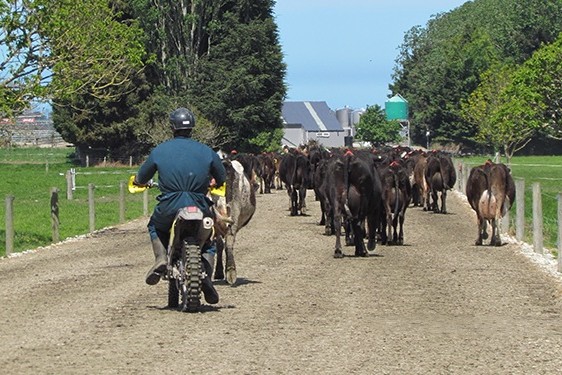With the Rugby World Cup about to kick off it’s a great time to hear some wise words on leadership and mental fitness from the All Blacks manager Gilbert Enoka. Anne Lee shares some of the insights he gave at SIDE this year to help farmers stay in the right mindset to cope with negativity and perceived threats.
Gilbert Enoka is living testament to the adage that your past doesn’t have to equal your future.
The highly successful mental skills and leadership coach has worked with elite sports teams for almost 20 years and has been a member of the All Blacks senior leadership team for most of that time.
As one of the longest serving members of what is arguably one of the most successful international sports teams of all time his mana is evident.
His start in life though was not easy. Left with six young sons when her husband left, Gilbert’s mum placed the then 18-month old into an orphanage along with some of his brothers.
He was there until he was 12. When he returned home after his mother teamed up with a new partner, life didn’t get any better with his “new Dad” an alcoholic.
At 16 he left home and headed for Christchurch where he studied a diploma in education specialising in physical education.
It was while working as a PE teacher he met Wayne Smith and the two have worked closely together ever since.
“You need three bones for success – a wishbone, a backbone and a funny bone.
Don’t grow a wishbone where you should have a backbone or you’ll spend your life wishing and that doesn’t work if you’re chasing great,” he says.
Studies into why some companies last and others don’t found that long-standing companies are often “radically traditional”.
“They preserve the core and disrupt around the edges.”
They are tirelessly tweaking and are more interested in getting better not bigger.
“If you want to improve things by 1000% then improve 1000 things by 1%.
“Opportunity doesn’t shout, it whispers.”
When teams lose that’s when they run the stethoscope of scrutiny over things but you don’t need to lose to learn, he says.
Culture eats strategy for breakfast with one business study finding culture is eight times more attributable to performance variation than strategy.
To foster a good culture ensure that “no one is more important than anyone”.
Set the standards – the standard you walk past is the standard you accept.
“Cultures are built through connections and connections are built by making sure you’re present when you are with people.
“Put down your phone – disconnect to connect and be where your feet are.”
If you have a problem or a whinge don’t share it with people cwho can’t do anything about it.
Don’t whinge across or down – only whinge up – to the person who can actually help.
Staying above the line is a great way to build good culture, a good sense of team and be in a mindset to better cope with challenges. But it is natural to slip below the line too and you shouldn’t beat yourself up about that when you feel it happening, Gilbert says.
“The key is don’t get stuck there. Recognise it for what it is and keep moving. If you can bring yourself back up you’ll go places.”
Above and below the line

Below the line behaviour
- If you’re in a mindset where you’re “below the line” you’re feeling closed to new ideas and learning, you’ll have a glass half empty view, be defensive and feel attacked.
- You’ll feel your story is the only right one, have to justify it and rationalise your view as the only view.
- You’ll feel like there’s a threat and that it’s serious.
- You’ll find fault and blame others, feel overwhelmed and pursue conflict for the sake of winning.
Above the line
- If you’re operating above the line you will be open, curious and see learning as more important than being right.
- You’ll see people as allies and there to help you grow.
- You’ll listen deeply, speak without arguing and question your own beliefs.
- You’ll see the funny side and live a life of play.
- What’s so important is to remember we’re hardwired to go below the line.
- Our brains are wired to react to threats to protect us and produce the fight-or-flight chemicals but our brains don’t distinguish between a real physical threat and a threat to our identity or ego.
- So when farmers read about new compliance regulations or take on board an anti-dairying campaign it’s a biological reaction to slip below the line.
- “If you get stuck down there, that’s when you become dysfunctional. Recognise it and bring yourself back up. Challenge each other to get back above the line.
- “Leaders can’t thrive if they’re in survival mode.”
- One adage the All Blacks look to is that a goal is theirs to take rather than theirs to defend.
- “If you focus on it being yours to defend then it’s yours to lose and that’s a negative view that sets off a series of events in your mind that lead to anxiety and a focus on the negative.”
- An organisation or person’s vision should excite and energise but don’t expect everyone to be on board immediately.
- “You need to behave your way forward so you create momentum that pulls others into the slipstream.”
- Having a plan that’s clear in how it should be executed is key too but leave some room for people to put their stamp on it.
- Positive thinking will only take you so far.
- Build in recovery time – you will have waves of stress so you need to have waves of recovery time.
- “There are two ways to do that – fill your mind or still your mind.”
- Yoga and meditation can still the mind while watching an action movie or reading a book can fill the mind.
- “Accept that you don’t have to be at your best all the time but be at your best when your best is needed.”





